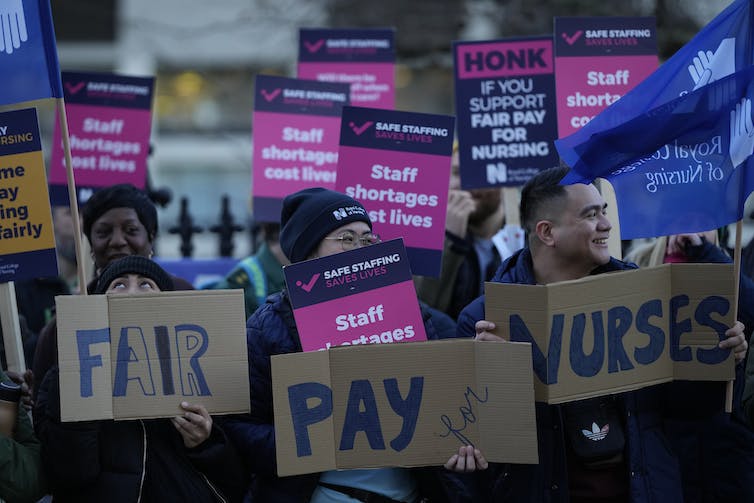Nurses of the University College Hospital protest in London on Feb. 6, 2023. The walkout is a part of a wave of well being employee strikes and demonstrations in current months. (AP Photo/Frank Augstein)
It is a “season of strikes” for health-care staff within the United Kingdom. Nurses and ambulance staff employed inside the National Health Service (NHS) in England, Wales and Northern Ireland carried out the most important strike within the group’s historical past on Feb. 6, 2023, after initiating strikes in December 2022.
Nurses, ambulance staff and physiotherapists will proceed their industrial motion this week. Junior medical doctors are set to comply with after voting in favour of strike motion this month.
Media consideration to those labour disputes by Canadian and worldwide information shops has been intriguing. Health staff strike with regularity all over the world, significantly within the COVID-19 period. Why, then, is there a lot curiosity in these specific strikes?
Holding up a mirror
One purpose is the context during which these strikes are occurring; the U.Ok. is dealing with labour disputes throughout a number of sectors, underscoring a broader and deeper disaster in government-labour relations within the nation.

Demonstrators maintain up placards in help of a strike by nurses outdoors St. Thomas’ Hospital in London on Dec. 20, 2022.
(AP Photo/Alastair Grant)
The world consideration might also be affected by their unprecedented nature: U.Ok. nurses had by no means gone on strike of their century-long historical past as organized labour. Scale additionally performs a task, as strikes prolonged to a big a part of the nation.
But another excuse motivating worldwide curiosity could be that the strikes within the U.Ok. maintain up a mirror to different elements of the world, together with Canada, reflecting the discontent of our personal well being staff.
Read extra:
Patient aggression and doctor burnout: The makings of a human sources disaster in well being care
The labour issues motivating this disaster — staffing shortages, pay, advantages, working situations, repeated waves of COVID-19, burnout — are occurring all over the world in several types of health-care techniques. This suggests there’s something basically askew with well being workforce coverage globally. How, then, would possibly the state of affairs within the U.Ok. present classes concerning the health-care disaster unfolding in Canada?
Protests in Canada
In the U.Ok., well being staff are demanding pay will increase that account for inflation, in addition to insurance policies to deal with staffing shortages and underinvestment within the health-care system. These issues bear conspicuous similarities to current demonstrations from well being staff throughout Canada.
Between 2021 and 2022, in response to the Armed Conflict Location & Event Data Project database of protests and political violence, there have been over 150 discrete demonstrations by Canadian well being staff in each Canadian province.
Some of the upper profile occasions included protests in opposition to Bill 124 which might have restricted pay will increase in Ontario, protests in opposition to underinvestment and privatization of well being providers in Alberta, and the scarcity of household physicians and nurses in British Columbia.
While the construction of Canadian well being care may not lead to a nationwide protest just like those within the U.Ok., the shared DNA throughout occasions in Canada is plain. These protests are clear manifestations of the deeper disaster in Canadian well being care, fuelled by underinvestment, staffing shortages and attrition, burnout and repeated waves of COVID-19 and different respiratory diseases.
These issues echo calls for from well being staff all over the world. An evaluation of world well being employee protests within the first 12 months of the pandemic discovered that the overwhelming majority of protests targeted on remuneration and dealing situations, corresponding to inadequate or unpaid wages, threat allowances and job safety. Clearly, well being coverage was not aligned with public declarations of well being staff as heroes and warriors.
Short-term options don’t resolve long-term issues
Many of the frustrations voiced by well being staff in Canada, the U.Ok. and different international locations predate the pandemic. Health staff have lengthy drawn consideration to issues of underinvestment and austerity by means of strikes and demonstrations.
Yet, well being system leaders proceed to deal with solely essentially the most instant fires that must be put out, quite than the underlying points impacting well being service availability and entry. Not sufficient consideration has been paid to the unintended penalties of utilizing shorter-term options to deal with the workforce disaster.

Nurses of the University College Hospital protest in London on Feb. 6, 2023.
(AP Photo/Frank Augstein)
For instance, journey or contract employment have grow to be a profitable possibility for nurses within the United States and Canada annoyed with their working situations and looking for extra flexibility. But, hiring these nurses comes at a excessive value to hospitals and creates lingering discontent within the workforce attributable to pay and advantages imbalances between journey nurses and workers nurses in the identical services.
Recruiting nurses from low- and middle-income international locations is one other resolution; but, this method leads to labour shortages in low- and middle-income international locations, the place migration is a gorgeous possibility for expert nurses attributable to workforce and system challenges in their very own contexts.
The U.Ok. well being employee protests echo issues right here in Canada and elsewhere. More importantly, they’re a harbinger of forthcoming labour disputes and systemic collapse if our well being techniques proceed to be characterised by austerity, underinvestment and neglect of well being employee voices.
Reform is urgently wanted to deal with these challenges in a way that pays heed to staff’ issues, appears to be like long run at workforce planning (and its penalties) and prioritizes sustainable funding in well being techniques. The prices of not severely participating with the sort of reform are clear for all to see, throughout the pond.
![]()
Veena Sriram receives funding from the Social Sciences and Humanities Research Council of Canada and the Canadian Institutes of Health Research.
Sorcha A. Brophy receives funding from the Social Sciences and Humanities Research Council of Canada.
